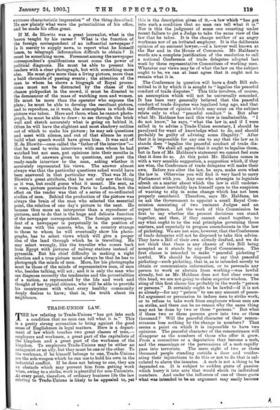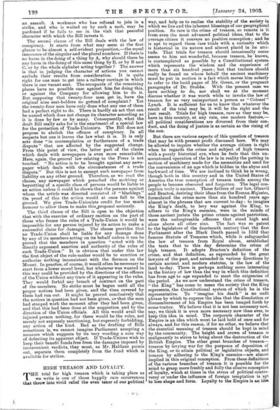TRADE-UNION LAW. this is the description given of it,—a law
which "has got into such a condition that no man can tell what it is." Nor is this the judgment of some one smarting under recent failure to get a Judge to take the same view of the law that he takes. It is the charge neither of an angry workman nor of an irritated employer. It is the deliberate opinion of an eminent lawyer,—of a lawyer well known at the Bar and in the House of Commons. Mr. Haldane's words are a complete justification of the resolution to call a national Conference of trade delegates adopted last week by three representative Committees of working men. Whatever our views may be of what the law on the subject ought to be, we can at least agree that it ought not to remain what it is.
The Conference in question will have a draft Bill sub- mitted to it by which it is sought to " legalise the peaceful conduct of trade disputes." This title involves, of course, an assumption which will not be universally conceded. It has been very generally believed that the peaceful conduct of trade disputes was legalised long ago, and that any differences of opinion which may exist on the subject relate only to what "peaceful conduct" is. But after what Mr. Haldane has said this view is inadmissible. " I do not know," he says, " what the law is, and if I were called in to advise a Trade-Union secretary, I should be paralysed for want of knowledge what to do, and should probably be guilty of advising some illegality." After that it is impossible for any one to say that the law as it stands does "legalise the peaceful conduct of trade dis- putes." We shall all agree that it ought to legalise them, but in face of Mr. Haldane's statement we cannot feel sure that it does do so. At this point Mr. Haldane comes in with a very sensible suggestion, a suggestion which, if they are wise, the Conference of trade delegates will make their own. Before you alter the law, he says, make sure what the law is. Otherwise you will find it very hard to carry Parliament with you. Any one who attempts to legislate afresh on a matter about which the law is still undeter- mined almost inevitably lays himself open to the suspicion of wanting to slip in some change which has not been properly considered. Therefore, says Mr. Haldane, let us ask the Government to appoint a small Royal Com- mission consisting of two eminent Judges and an expert layman. Let the work of this Commission be first to say whether the present decisions can stand together, and then, if they cannot stand together, to say what ought to be the real principles governing these matters, and especially to propose amendments in the law of picketing. We are not sure, however, that the Conference of trade delegates will not be disposed to take this advice. They have a Bill of their own already drafted, and we do not think that there is any chance of this Bill being accepted as it stands by any Royal Commission. The first clause is intended to make "peaceful picketing " lawful. We should be disposed to say that peaceful picketing—such picketing, that is, as is intended merely to obtain or communicate information, or to persuade any person to work or abstain from working—was lawful already, but as Mr. Haldane does not feel clear even on this head, we are not going to claim superior wisdom. The sting of this first clause lies probably in the words " person or persons." It certainly ought to be lawful—if it is not so already—for any "person" to use any amount of peace- ful argument or persuasion to induce men to strike work, or to refuse to take work from employers whose men are on strike, and there can be no reason why the same thing may not be done by two or three " persons." But what if these two or three persons grow into two or three thousand ? Will the peaceful character of their remon- strances lose nothing by the change in numbers ? That seems a point on which it is impossible to have two opinions. The peaceful character of the remonstrance will disappear as the numbers of those who offer it grow. From a committee or a deputation they become a mob, and the reasonings or the persuasions of a mob rapidly pass into terrorism. The mere sight of two or three thousand people standing outside a door and vocifer- ating their injunctions to do this or not to do that is cal- culated to alarm the inmates. A mob is not a thing to be depended on. It is subject to sudden gusts of passion which hurry it into acts that would shock its individual members. And under the influence of one of these gusts what was intended to be an argument may easily become an assault. A workman who has refused to join in a strike; and who is waited on by such a mob, may be pardoned if he fails to see in the visit that peaceful character with which the Bill invests it.
The second clause of the Bill deals with the law of conspiracy. It starts from what may seem at the first glance to be almost a self-evident proposition,—the equal innocence of the singular and the plural numbers. If there is no harm in the doing of a thing by A, why should there be any harm in the doing of this same thing by B, or by B and C, or by the whole alphabet acting together ? The answer is that in judging the character of actions you cannot exclude their results from consideration. It is quite right for one man to get into a railway carriage in which there is one vacant seat. The occupants of the remaining places have no possible case against him for doing this, or against the Company for allowing him to do it. But supposing that twenty-four men get in, have the original nine seat-holders no ground of complaint? Yet the twenty-four men have only done what'any one of them had a perfect right to do. There is hardly an act that can be named which does not change its character according as it is done by few or by many. Consequently, what the draft Bill really asks for is the enactment of a special law for the protection of Trade-Unionists. The Bill does not propose to abolish the offence of conspiracy. In all respects but one it leaves the law what it is. It is only acts done "in contemplation or furtherance of a trade dispute " that are affected by the suggested change. Prom this point of view, the latter part of the clause which deals with newspapers is even more remarkable. Here, again, the general law relating to the Press is not touched. "No action is to be brought against any news- paper which deals with the circumstances of a trade dispute." But this is not to exempt such newspaper from liability on any other ground. Therefore, as we read the clause, any newspaper which preached the mobbing or boycotting of a specific class of persons would be liable to an action unless it could be shown that the persons against whom the article was directed consisted of " blacklegs." On proof of this the action would at once fall to the ground. We give Trade-Unionists credit for too much humour to allow them to make this.proposal seriously.
The third clause of the Bill is open to the objection that with the exercise of ordinary caution on the part of those who frame the rules of a Trade-Union it would be impossible for any person injured by its action to make a successful claim for damages. The clause provides that no Trade-Union shall be liable for any damage done by any of its members acting on its behalf unless it can be proved that the members in question " acted with the directly expressed sanction and authority of the rules of such Trade-Union." It is obvious that under this law the first object of the rule-maker would be to sanction or authorise nothing inconsistent with the Sermon on the Mount. In practice, of course, it would often be necessary to start from a lower moral level, but whatever was wanted in this way could be provided by the directions of the officers of the Union without any trace of it appearing in the rules. They would forbid any breach of contract on the part of the members. No strike must be begun until all the proper notices had been given, and the time covered by them had run out. It might be proved conclusively that the notices in question had not been given, or that the men had stopped work the moment after they had been given, and that this had been done at the suggestion and by the direction of the Union officials. All this would avail the injured person nothing, for there would be the rules, not merely not expressly sanctioning, but expressly forbidding, any action of the kind. Bad as the drafting of Bills sometimes is, we cannot imagine Parliament accepting a measure which suggests by its very wording a sure way of defeating its apparent object. If Trade-Unions wish to keep their benefit funds free from the damages imposed by inconvenient verdicts, they must, as Mr. Haldane points out, separate them completely from the fund which is available for strikes.







































 Previous page
Previous page